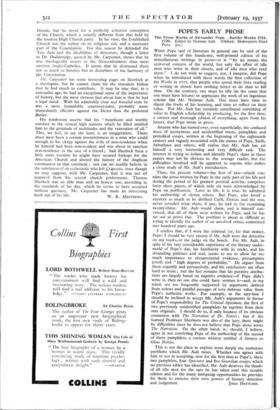The Prose Works of Alexander Pope. . Earlier Works 1711-
1720. Edited by Norman Ault. (Oxford : Shakespeare Head
POPE'S EARLY PROSE
PECS& 308.)
WHAT Pope said of literature in general can be said of the first volume of this handsome, well-printed edition of his
miscellaneous writings in prose—it is "by no means the universal concern of the world, but only the affair of idle men who write in their closets, and of idle men who read there." I do not wish to suggest, nor, I imagine, did Pope
when he introduced with these words the first collection of his Works in 1717, that people who spend their lives reading
or writing in closets have nothing better to do than to kill time. On the contrary, one must be idle (in the sense that one must have leisure) to appreciate the work of an ingenious scholar like Mr. Norman Ault. One must have time to digest the fruits of his learning, and time to reflect on their value. For Mr. Ault has certainly contributed something of value to English scholarship by producing, for the first time, a correct and thorough edition of everything, apart from his letters, that Pope wrote in prose.
Anyone who has turned over, even superficially, the confused mass of anonymous and unidentified tracts, pamphlets and periodical essays, written at the beginning of the eighteenth century and vaguely associated with the names of Pope, Swift, Arbuthnot and others, will realise that Mr. Ault has set himself a very interesting and very difficult task. The interest in trying to isolate and identify Pope's share in these papers may not be obvious to the average reader, but the difficulties involved will be apparent to anyone who makes a close study of Mr. Aules introduction.
Thus, the present volume—the first of two—which con- tains the prose written by Pope in the early part of his life and during the period of his greatest poetical activity, comprises forty short pieces, of which only six were acknowledged by Pope on publication. Later in life, it is true, he admitted his authorship of eleven others. But Pope, who loved a mystery as much as he disliked Curl, Dennis and the rest, never revealed what share, if any, he had in the remaining twenty-three. Mr. Ault would claim, and is himself con- vinced, that all of them were written by Pope, and he has set out to prove this. The problem is about as difficult as trying to identify the author of an unsolved crime, committed two hundred years ago.
I confess that, if I were the criminal (or, for that matter, Pope) I should be very uneasy if Mr. Ault were the detective on my tracks, or the judge on the bench. For Mr. Ault, in spite of his very considerable experience of the literary under- world of Pope's day, his familiarity with its tricks, and his abounding patience and zeal, seems to me to allow far too much importance to circumstantial evidence, presumptive proofs and "high degrees of probability." He argues from them cogently and persuasively, and his conclusions are often hard to resist ; but the fact remains that his putative attribu- tions are largely based on negative evidence—if Pope didn't write it, then no one else could have written it—and, to my mind, are too frequently supported by arguments derived from echoes and parallel passages of very dubious value from Pope's authentic works. For example, in the jury-box I should be inclined to accept Mr. Ault's arguments in favour of Pope's responsibility for The Critical Specimen, the first of two previously unidentified pamphlets he reprints from their rare originals. I should do so, if only because of its obvious connexion with The Narration of Dr. Norris ; but if the learned Professor Sherburn was also of the jury, there might be difficulties since he does not believe that Pope alone wrote The Narration. On the other hand, w. should, I believe, agree in not convicting Pope of the authorship of the second of these pamphlets, a curious whimsy entitled A Sermon on Glass Bottles.
This is not the place to explore more deeply the numerous problems which Mr. Ault raises. Whether one agrees with him or not in accepting, now for the first time as Pope's, these two pamphlets, four Spectator and five Guardian essays, which no previous editor has identified, Mr. Ault deserves the thanks of all idle men for the care he has taken over this notable edition and for the many intriguing opportunities he provides for them to exercise their own powers of literary detection














































 Previous page
Previous page